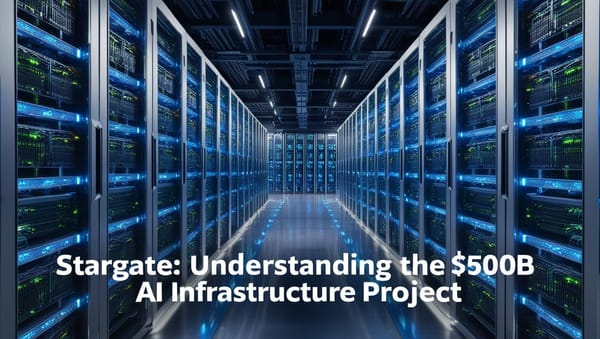The Real State of AI: What Business Leaders Actually Need to Know

Remember when people thought the internet was just a fad? Yeah, me too. Awkward.
Here's a mind-blowing fact about the pace of innovation: While it took the automobile 50 years to reach 100 million users, generative AI hit that mark in just two months. Two. Months. That's less time than it takes to form a new habit or master a basic workout routine. We're talking about technological adoption at supersonic speed.
The "It's Just a Phase" Club (Spoiler: They Were Wrong)
Let's take a quick trip down memory lane to visit some spectacular moments of doubt in technological history:
"The horse is here to stay, but the automobile is only a novelty–a fad."
- Michigan Savings Bank President, 1903 (who definitely regretted that one)
"Steam power has served us well for seventy years–why risk our entire factory infrastructure on unproven electric motors?"
- Every factory owner who later got left in the dust, circa 1900
And my personal favorite:
"Our customers don't want this internet thing; they value the traditional mall experience!"
- Retail executives in the 1990s, who now probably sell on Amazon
See a pattern? We humans are fantastic at underestimating change, or at least being spectacularly wrong about it. It's like we're wearing technological horse blinders, convinced that whatever worked yesterday will work forever. Spoiler alert: it won't.
AI: Not Your Grandfather's Technology
When I first started exploring AI back in 2019, I was teaching computers to play Snake and building models for linear regression (fancy talk for teaching computers to draw really accurate trend lines). Picture trying to teach calculus to a calculator – technically possible, but with a lot of "it's not you, it's me" moments.
Fast forward to today, and while we haven't quite reached the "Rosie the Robot making your dinner while cleaning the house" stage (sorry, Jetsons fans), we're definitely in interesting territory. Let's break down where AI actually stands – flying cars not included (yet).
The Five Stages of AI (We're at a Fascinating Crossroads)
- Chatbots (Functional): We've gotten pretty good at this one. Modern AI can write sonnets, debug code, and analyze your business strategy – all before its first cup of virtual coffee. But this is just the appetizer.
- Reasoners (Emerging): Leading AI labs are developing models that can actually reason through problems like a philosophy major at 3 AM. If you haven't heard about these models yet, well... let's just say some of us are already pushing their limits while others are still trying to figure out if AI can write their next tweet. Time to level up that tech awareness, or make friends with someone who is.
- Agents (Just Beginning): We're taking our first steps into AI that can actually do things independently. Think scheduling assistants that actually schedule and automation tools that chain together complex tasks. Like ambitious new graduates, they're brilliant at specific assignments but get lost if you ask them to "just figure it out." Best stick to letting them handle the structured stuff for now.
- Innovators (Future): Eventually, AI will help invent new things. But for now, it's more "here's 101 variations on a chair design" than "I've just revolutionized physics."
- Organizations (Distant Future): Fully AI-run companies are still more sci-fi than reality. Think less "robots running the board meeting" and more "AI and humans having a productive work marriage."
"Cool Story, But What Can AI Do for My Business RIGHT NOW?"
Glad you asked! Let's get practical:
Real Estate Revolution
Remember when staging a house meant renting furniture and praying nothing gets scratched? AI can now virtually stage homes faster than you can say "open concept." It's like Photoshop met HGTV and had a very efficient baby.
Healthcare Transformation
AI is now spotting diseases in medical images faster and more accurately than human doctors. It's like having a radiologist who never needs coffee breaks and doesn't get grumpy during night shifts.
Customer Service Evolution
Major banks are now using AI to detect customer emotion and intent in real-time during calls, automatically routing frustrated customers to senior agents while letting chatbots handle the happy folks asking about their balance. It's like having a super-empathetic receptionist who always knows exactly when to grab the manager (and we've all wished for that during a heated call).
The Future Is Knocking (And It Brought Snacks)
Here's what's coming down the pike:
Personalization at Scale
You know that amazing server at your favorite restaurant who remembers your usual order? Imagine that level of personalization everywhere you go, but powered by AI. It's like having a personal concierge for... well, everything.
Education 2.0
Picture a world where every student gets a customized learning experience. No more one-size-fits-all education – it's like having a tutor who perfectly understands how your brain works.
Shopping Without the Shopping Part
Forget checkout lines. Future stores will know what you've picked up and bill you automatically as you walk out. It's like having a really efficient personal shopper who's also really good at math.
The Human-AI Symphony
Here's the thing about AI that often gets lost in the hype: it's not about replacing humans - it's about augmenting what we already do well. Think of AI as the ultimate band backing track, making every human performer sound even better. It handles the repetitive bass line while we improvise the creative solos.
The Bottom Line
AI isn't just another tech trend to watch from the sidelines. It's the biggest shift in how we do business since the internet, and it's moving faster than a caffeinated cheetah. But unlike previous revolutions that often displaced workers, AI presents a unique opportunity to enhance human capabilities rather than replace them. Sure, some jobs will change dramatically (pour one out for all those "please hold" recordings), but the real magic happens when AI handles the mundane stuff.
The question isn't whether AI will transform your industry – it's how you'll use it to empower your team to do what humans do best: innovate, empathize, and solve complex problems creatively.
Remember those Michigan bankers who passed on Ford? Don't be those guys. But also remember that Ford's success wasn't just about the machines - it was about how those machines empowered humans to be more productive and creative than ever before.
About the Author: When not predicting the future of technology or trying to teach AI the concept of humor, I help businesses navigate the wild west of emerging tech. Sometimes I succeed. Sometimes the AI tells better jokes than I do.
Want to stay ahead of the AI curve? Subscribe to our newsletter for weekly insights on how to make AI work for your business (without getting replaced by it).




